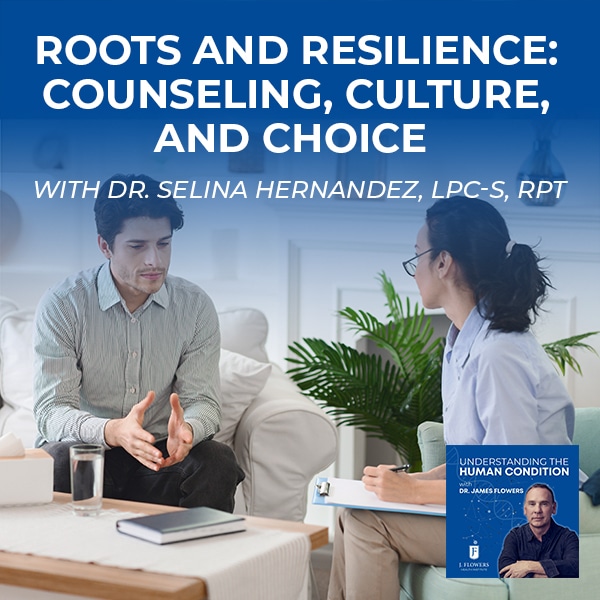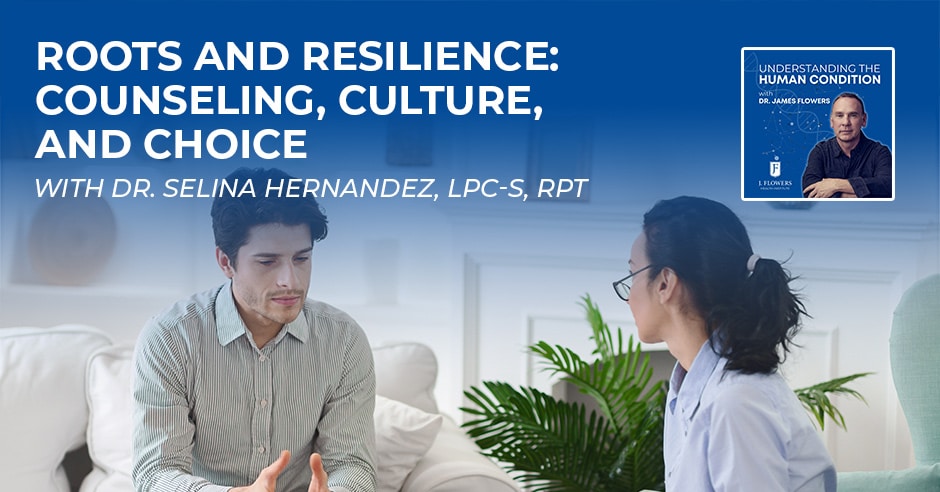
Culture plays a significant role in shaping our identities and experiences. In this episode, Dr. James Flowers sits down with Dr. Selina Hernandez, a licensed professional counselor supervisor and registered play therapist, to delve into the profound influence of culture on the human condition. Dr. Selina shares how her experiences with cultural identity and resilience have shaped her counseling approach. They discuss the importance of cultural strategies in therapy, personal responsibility, and the transformative power of sand tray therapy. Dr. Selina also explores the challenges faced by women and men, the importance of a counselor’s orientation, and the role of understanding one’s roots in building resilience.
—
Watch the episode here
Listen to the podcast here
Roots And Resilience: Counseling, Culture, And Choice With Dr. Selina Hernandez, LPC-S, RPT
Everybody. I have Dr. Selina Hernandez, who is a primary therapist here at J. Flowers Health Institute. We’re going to be talking about therapy in general but her expertise area is sand tray. Welcome, Dr. Selina Hernandez. Selina or Dr. Hernandez.
I’m so excited to be here a little nervous. I will say that.
Don’t worry about it. Casual super casual. I would like to read a bio about you so that I don’t mess it up. As a Licensed Professional Counselor Supervisor and a Registered Play Therapist, my clinical expertise encompasses a broad spectrum of therapeutic services for children, adolescents, adults, and families across outpatient and inpatient mental health settings. Her professional commitment is deeply rooted in challenging and reducing the stigma associated with mental health, you do a great job with that, by the way, with a particular focus on enhancing the well-being of individuals within minority communities.
She places a significant emphasis on the pivotal role of cultural understanding in the therapeutic process. Recognizing and appreciating the influence of culture on an individual’s experiences is fundamental to crafting personalized treatment plans. The approach ensures that therapy is relevant and resonates on a personal level, fostering a more effective and meaningful therapeutic journey. In her practice, she’s dedicated to remaining abreast of the latest therapeutic approaches and techniques and she’s most suited to meet clients’ diverse needs from various cultural backgrounds.
The Influence Of Culture On The Human Condition
Again, welcome Dr. Hernandez. I remember while I was reading that I was thinking of a long time ago my dissertation but I did it on first and second-generation Hispanic Americans that suffered from chronic pain. I went to my first stop was Laredo, Texas. I interviewed, a dozen people from Laredo and then I went to San Diego. I went to Arizona, went to Michigan, and interviewed immigrant Farm Workers, and really all over the country for my dissertation. The results of the outcome of the dissertation were really looking at the lived experiences of that population and it was amazing how much culture came out of it and what their belief system about chronic pain is.
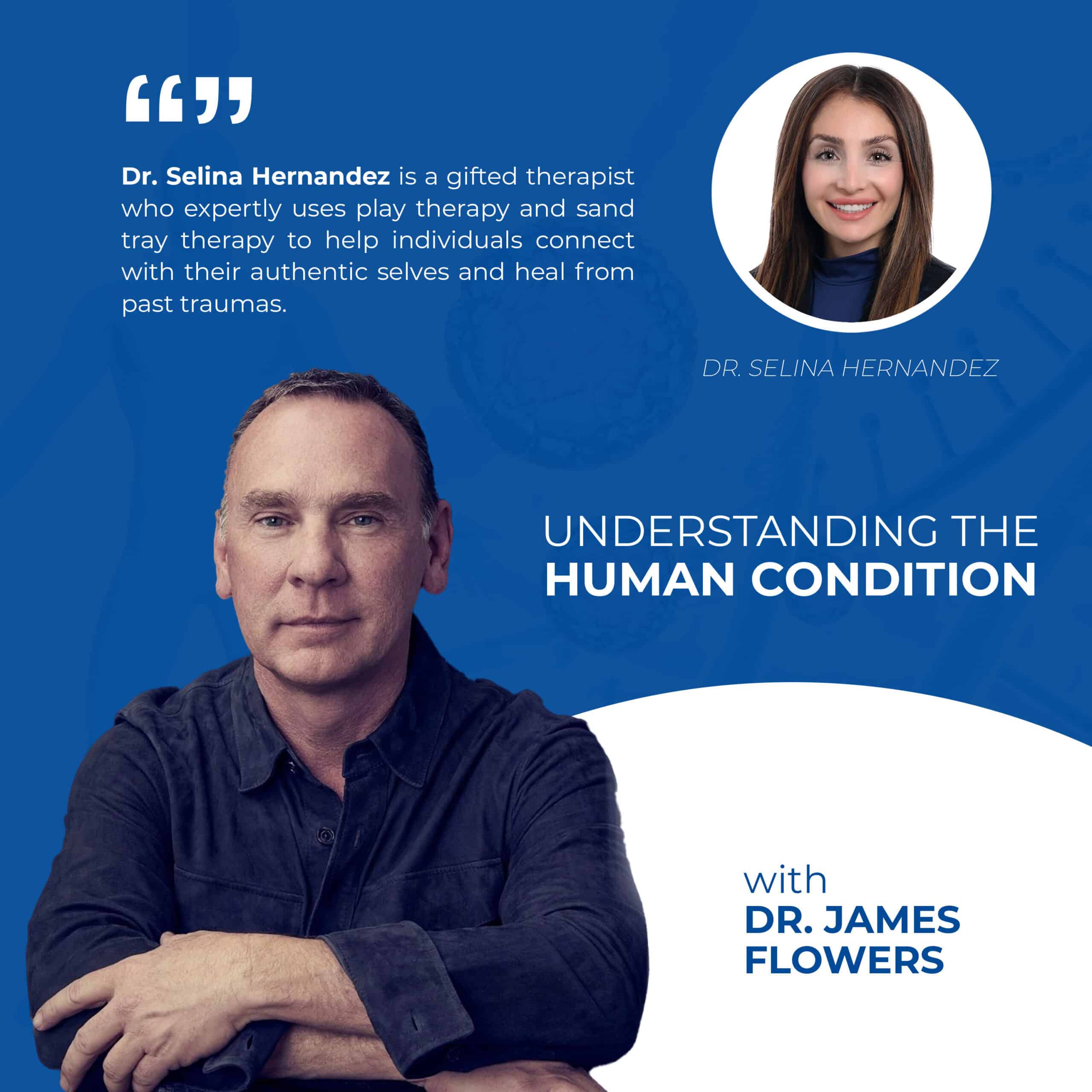
I think culture plays a huge role in who we are. It is imperative that we understand of the culture and have our clients also educate us on their culture because we can also go in with thinking that we know this, and I have a great example. I think really early in my career, I remember I got a client and his background was Mexican-American, and I was so excited because I was like, “I’m Mexican-American too, this is me.”
I was just so excited to have him as a client. When in with expectations thinking that I need you. After that session, I came out and I was like, “What type of Mexican-American is this man?” That’s where I learned. I’m so happy that it was really early in my career on how important that culture piece is and being able to go into that session and despite us knowing what their background is also having the client educate us on their background.
Growing Up In A Chaotic Environment
Speaking of cultural, you are from one of my favorite places in the world, South Texas. I grew up in South Texas, of course, and you grew up in South Texas specifically Laredo. What was it like growing up and Laredo? What was the impetus for you to decide? It was a high school or college that you said, “I was going to be a counselor.”
I’m from Laredo, Texas. One of the questions that I get asked, just kind of related to all of this is, “What language did you speak first?” I actually don’t know. I think that in Laredo in school, we spoke in English and we speak in English but then at home, it was Spanish. I just remember being able to speak both.
We’re probably bilingual.
I just don’t remember what language I spoke first. I think one of the reasons that influenced me to become a counselor was the fact that I grew up in chaos myself. I grew up witnessing domestic violence. My father used to use alcohol and other drugs as well too. I have three sisters. I’m the second one, and so my oldest sister and myself, we got to witness that the most.
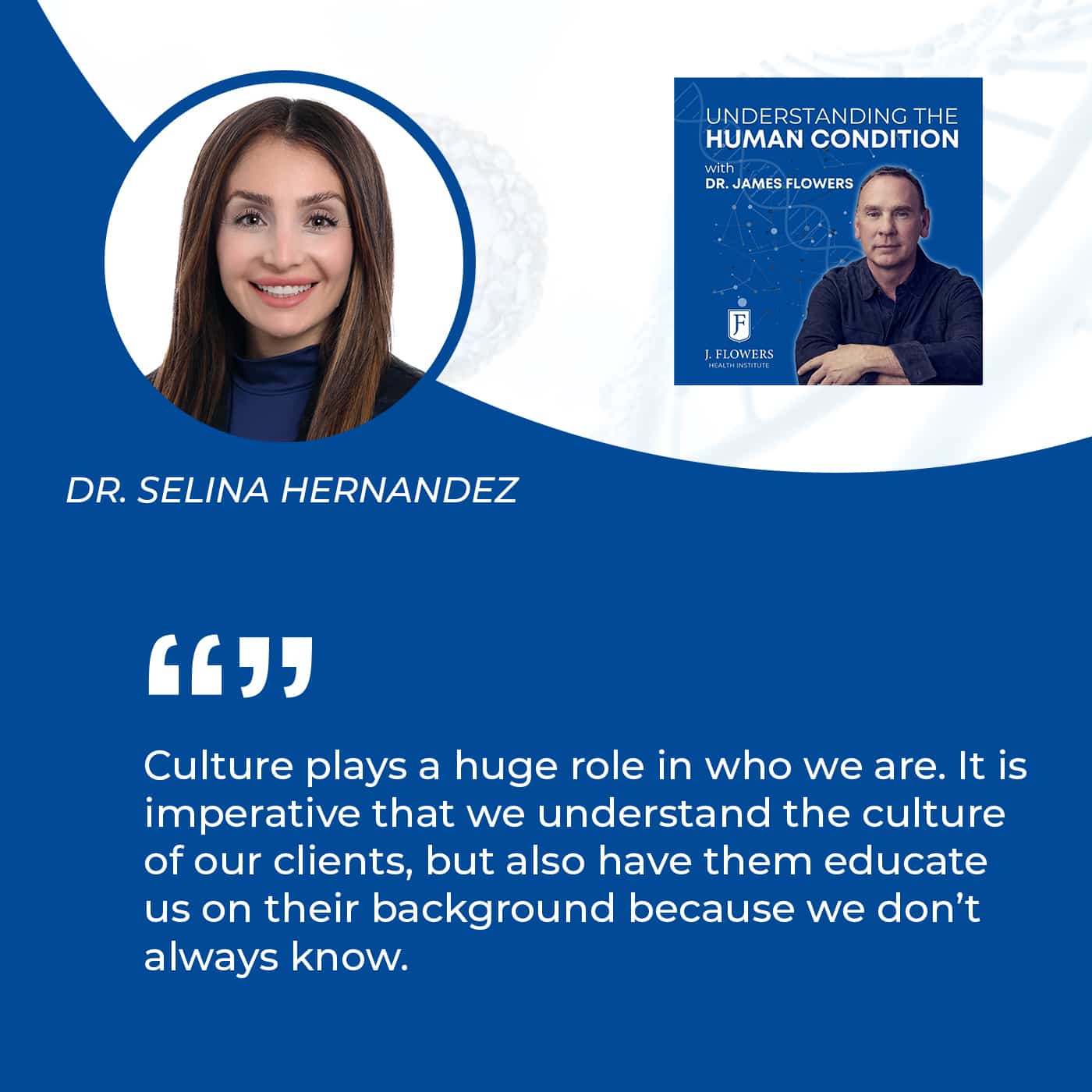
We lived in chaos for a while which meant sometimes having no money or stressful, not even going to school either because we stayed up all night. Taking care of my siblings or mom as well too. Just like feeling scared. I do have to say that my father also changed his life. He’s been a change man for about 25 years now. Not only do I know what it is to live in chaos, but I also know that people can change if they want to change.
People can change if they want to change.
I always tell my dad, “Once you change your life, you change the entire trajectory of us, of my sisters and I.” That’s one of the reasons I decided to become a counselor. Living through that and witnessing that, but also just I’m going to be really honest. I didn’t know what a counselor was until I started college because my goal was to be an FBI agent because that’s how I wanted to help people. I knew I wanted to help people. I do know that once I had my first internal site class, I was like, “No, this is what I want to do. This is how I want to help others.”
That’s amazing. Similar background, similar family style. I grew up in chaos, the same thing. My father was an alcoholic and abused my mother, and my sisters and I would take care of my mother. Even though I was the youngest, I was the only boy, and I would take care of my sisters. My father died before he could get well. My father died of a heart attack at 40 when I was only ten years old. I’m so happy that your father found his own recovery because he recovered not only himself but also his family and regenerated you and really had a positive impact on your life. That’s amazing. I’m so happy that the story turned out that way.
My parents are still married. I think 39 years of marriage. I understand that it was chaotic. I understand that no one should live like that, but I also now see it as it needed to happen in order for me to be where I am because I am the author of my story. I am taking ownership of that and there were moments where I would say like, “Why?” There were moments where I was like, “Why couldn’t we be rich or have this or that?”
Had a little bit of resentment at the time.
I think it was not until maybe me being a counselor, as I started to like, “I need to make sure that I find peace in this and that I forgive as well too so I can be able to be a great counselor.”
Have some gratitude actually for what you went through and the resilience that you and your mother and your sisters had so that now you guys are all healthy and happy and thriving.
I’m being able to also like demonstrate grace. I had to do a lot of reflecting too. Like my parents didn’t know what they didn’t know. All they knew was what they knew. They didn’t have the tools. They didn’t have the resources either. They didn’t have conversations with their own parents of like, “You’re feeling sadness. You’re feeling anger.”
They didn’t talk about emotions.
There were just no discussions on those and being able to extend grace and knowing that my parents did the best that they could with what they had. Being able to understand that piece, but now being able to have conversations with them and so forth and being able to move forward. The goal is always to move forward.
It’s so amazing to me that people like you and I and other people in general in the population who grew up in dysfunction, sometimes grow up and have resentment that they never get over. They’re angry, they’re mad at their parents, they’re mad at their siblings, they’re mad that they didn’t have money or they didn’t have a healthy family, and they don’t take that step to get into therapy.
It’s so important that when you realize, sometimes as a child, we cannot go to therapy on our own, of course, but as an adult, I always say, “Once you’re an adult, we’re responsible for ourselves and we have to take ownership. We have to do things to take care of ourselves by getting into therapy.” I say this all the time on understanding the human condition, but I go to therapy myself every Tuesday with my psychiatrist.
She and I sit for an hour and we just talk. It’s amazing the cathartic experiences that I have almost every week of being able to just to talk about, I still talk about my mother, I talk about my father who died when I was ten. I talk about my siblings and my relationships. It’s so important because we need to have that outlet of a therapist or a psychiatrist or whatever it is, whoever it is mental health-wise that we’re meeting with so that we can put that behind us and then maintain it.
I love that because I think that even as counselors, we don’t have all the answers. We’re always learning as well too. We don’t know what we don’t know. Also having a middle person as well too. Being able to also challenge us. That’s great because we’re evolving. The goal is to self-actualize. If we’re trying to self-actualize, we also need to be challenged and confronted from time to time as well too. The goal is to grow and be a better version of ourselves every single day. How do we do that? By also being able to have that therapist. Every counselor needs a counselor. because we want to grow we want to be better as well too.
The goal is to grow and be a better version of ourselves every single day, and to do that, we need to be challenged and confronted from time to time.
Decision To Become A Play Therapist
When did you decide during your graduate training that you wanted to be a registered play therapist? I went through play therapy classes with Dr. Emily Oe who was a world-renowned play therapist and wrote books. It was amazing. I didn’t take that route, but I loved the experience of going through that as part of my training. You really enjoyed it so much that you became the registered plate therapist and you do that in your daily therapy here in J. Flowers and other places. I’m sure.
Yes, and so even with my children because I want to make sure they have tools. I think I got inspired. I was an intern. I was an intern. I was working at a psychiatric hospital. Although I was the therapist for the adolescent females and then adolescent males, from time to time I would go to the children’s unit because they needed help in completing intake assessments or reaching out to the families, etc. I would go to the unit sometimes and then I’ll also do some group therapy with the children. There was this sadness because they were so young. Being in a psychiatric facility, what’s going on here?
Those would be questions that I would ask myself. That’s where I got inspired. I say, “I want to make a difference. I want to be able to work with children because despite me working with adolescents and adults as well too, if someone has not healed their inner child continue to be with them despite their external changes.” Because I’ve seen the evolution of an unhealed child, being a play therapist is like this is where we can make the most impact. That’s where I got it. That’s when I decided that I wanted to be a play therapist.
If someone has not healed their inner child, it continues to be with them despite external changes.
I remember doing therapy 25, 27 years ago and I would sit with my therapist and say something and she’d say, “That was about your eight-year-old self saying that. Let’s talk about your twenty-year-old self doing that.”
I think when work has not been done when we haven’t taken those steps towards healing, the wound remains. It just also depends on what age did that wound open. We stay stunted as well, too. I think it’s just important that we do this healing work.
Play Therapy
For those in our readers who aren’t familiar with play therapy, and again, I love the process of play therapy. The one thing I learned the most about play therapy is you, as a therapist, you really have to have patience because it can take weeks or months for something to come out that you’re not sure. That we’re not sure about or the child or the adolescent or even the adult isn’t ready to talk about or ready to act out right in the therapeutic process. Why don’t you tell our readers what play therapy is and what it means for someone to go through that process and maybe walk someone through a process?
In play therapy, children are not able to go to a therapy session and sit down and say what’s going on with them. Through play therapy, using specific toys. It is believed that through their play, that’s their language. That’s how they share or they communicate what is going on. Being able to have toys, and using specialized toys in the therapeutic setting is going to be imperative because that’s how children communicate through their play. As a therapist, we will sit down and yes, Dr. Flowers, you’re right.
We need to have a lot of patience because it will take some time. Just like an adult that takes some time to trust someone, a child as well too. I think one of the greatest things about play therapy for a therapist is children are not expecting you to be anything other than just yourself. As a therapist, that’s also great for you because you don’t have to go into that room being anything other than yourself but being able to be there and being able to just support and observe the child as they’re engaging.
One of the greatest things about play therapy is that children don’t expect you to be anything other than just yourself.
You’ll get to see the child gravitate to this side. Like the art supplies or the more aggressive toys or just depending on the toys that are in the setting. Through our observations, and yes, it will take time. I will tell parents, “This is not a quick fix. This is not something that I’m going to be able to tell you in the 1st, 2nd, 3rd, 4th session. It will take some time. Sometimes it is maybe the 10th session or the 12th session when we have more insight that we can provide.”
It also allows the child to feel comfortable and safe and to be able to trust the therapist and be their authentic self eventually as well too. They can be able to show. What is a constant theme that they’re playing in the playroom? As a therapist, we can start figuring out some struggles, maybe some social skills. Maybe some abuse as well too but it is with time.
I still remember 28, 29 years later, the very first intern client that I had for play therapy was a kindergarten student. I would go to his classroom and get him from class and then go to the therapy room and do play therapy with him for 45 minutes or 50 minutes. The semester was fifteen weeks long. I did not glean anything for fourteen weeks. He never did anything. He never really moved.
He didn’t really pick toys. He didn’t do a lot. I just reflected on movements for 45 minutes a week. Every week. On that 15th week, I said, this is our last session, “I wish you all the best and blah, blah, blah.” Thinking, “I failed here. I really did a crappy job for this poor child.” At the end of the session, I stood up. When I stood up, he turned around and looked at me and just spewed everything that was going on for him in the sexual abuse that his mother was using him for, I guess.
He just broke down and as a kindergarten student, and just wouldn’t stop talking about it for half an hour. It took fifteen weeks for him to fill that trust. I felt, of course, very sad, but I felt accomplished and proud. I actually kept in touch with him, and he’s doing amazing today, but he did a lot of therapy throughout his life. I just respect so much the therapeutic process of play therapy. I love that you brought it to J. Flower. Thank you for doing that.
Sand Tray Therapy
I know, you’re welcome. One of the most fascinating things with play therapy is I got introduced to the sand tray.
I’d love to know more about sand tray. Tell us about that.
As I was going through my training with play therapy, it was an entire year. I had to meet once every month for training and also gather hours for that as well. There was one day where we were just going to dedicate it to sand tray therapy. I was like, “What is this? I had never heard of that before.” All I knew was that sands were going to be involved.
Sand must be involved.
I was so fascinated. I was just like, “This is so amazing.” Through my training, I had to do it myself. I think like any great counselor, before you do any technique, you have to do it on yourself. They had us make three trays. Create a scene from the past, a scene from the present, and a scene of where you see yourself in the next five years. I was crying in all three of them. I just didn’t know why I was crying.
I was like, “This is just so powerful.” Like, I didn’t know. There was all this emotion attached to these miniatures or just the scene itself. From there on I said, “This is something that I am going to definitely dive in because I can see the benefits of sand tray and specifically across, talking about culture.” sand tray can be a really great modality to be able to help people communicate and make it easier for them.
Can you think of a case that you’ve worked on here at Flowers that you used sand tray and really helped someone discover themselves?
I do have one. I remember she was a female. She really did not like to talk about emotions. Her entire life, she’s been a caregiver but also been really strong. She would always tell me, “I’ve done I’ve done some hard stuff.” I’m like, “That’s great. What we’re going to do we’re going to do is sand tray.” I asked her the prompt that I gave her, “I want you to create a scene.” That was simple. It was just so interesting to me that based on just her family dynamics and everything that was going on, there were things that she created first that also just helped me understand that she does not put herself first.
As soon as she finished her tray and I had her just say a little bit, race for a moment, and just think about, “Where are your thoughts right now? What are some of the things that you’re feeling as you but that would you create it?” I’d just started to see her body language get super uncomfortable. I was like, “Emotions are coming.” Even though she was always so strong and never wanted to show any emotions, through that sand tray, we actually used that sand tray for three sessions and we continued to process that.
There was so much there. There were realizations that she made of how she never put herself as a priority. Didn’t know she had a voice either, but also was able to be able to put her inner child, her present self, and her ideal self. Also being able to talk about her present self and how when she is unable to control the situation. How she get so dysregulated? She was even so fascinated. I was like, “I didn’t even know I created this. I didn’t even know there was all this there.”
Understanding The Human Condition
That’s so cool. I know that you have so many stories about sand tray because we get to hear them and talk about them. Thank you for what you do in sand tray therapy and play therapy and all of the therapy that you do. I know you are an amazing therapist and we love having you at J. Flowers. I’m going to put you on the spot here. Tell me what your idea of what is understanding the human condition. What does that mean to you?
To me, understanding the human condition is I don’t know why I think immediately authentic self. Like, who are we really? I think that, obviously, from the moment that we’re born, we are our authentic selves, but as we start engaging with the external world, we start experiencing situations and so forth. I think that, as human beings, we start developing defense mechanisms to protect ourselves. I think understanding the human condition is really, basically, I have a question is who is your authentic self? Like who are you authentically? That’s what I think of.
When we’re out, when we grow up as you and I did and so many other people that grow up with traumas and really even in healthy environments that people grow up in, you go out and you somewhat put a mask on. You act one way when you’re internal and at home and you act another way when you’re at work and another way and socializing. If you can just bring all that down and be your authentic self all the time, wouldn’t it be amazing?
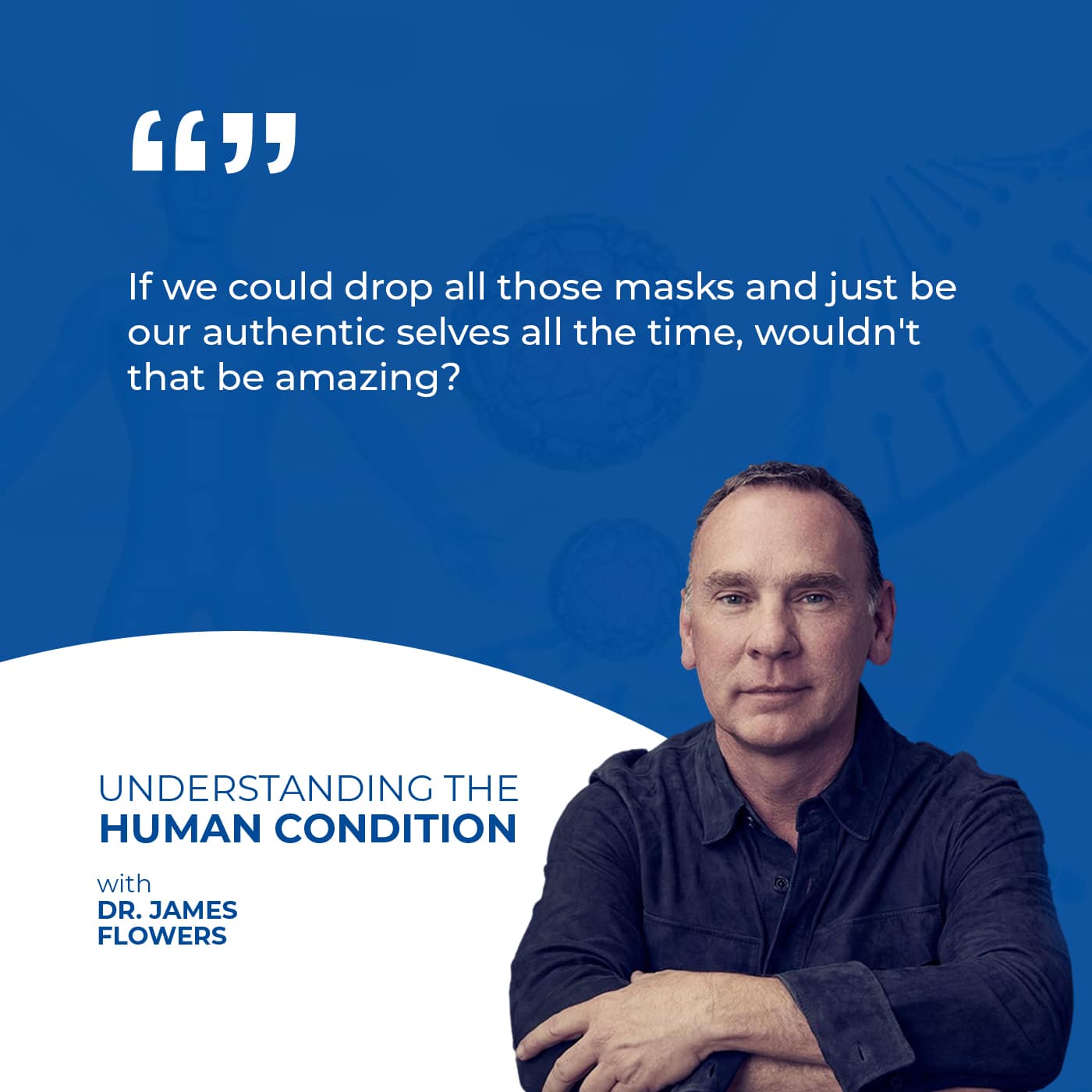
It would be amazing. I think of a quote from Carl Rogers. I don’t want to butcher it because I don’t have a verbatim. In his quote, it’s basically he’s trying to say, “When we are able to admit who we are with all our flaws and stuff, then change can happen and then we can move forward to being our authentic selves.”
I love that. I think that’s a perfect way to end this. I really appreciate you taking the time. I know how busy you are in doing this. I cannot wait to listen to it again. If you guys want to reach out to Dr. Hernandez and ask questions about sand tray or play therapy, her email address is [email protected]. If you’d like to know more information about what we do at J. Flowers Health, then reach out to us at 713-783-8866 or JFlowersHealth.Com. I’m Dr. James Flowers. Thank you for reading. Selina, again, thanks so much.
Thank you.
We’ll see you. Take care of everybody.
Important Links
- Dr. Selina Hernandez – LinkedIn
- Selina’s Email
- Flowers Health
About Dr. Selina Hernandez, LPC-S, RPT
 As a Licensed Professional Counselor Supervisor and a Registered Play Therapist, my clinical expertise encompasses a broad spectrum of therapeutic services for children, adolescents, adults, and families across outpatient and inpatient mental health settings.
As a Licensed Professional Counselor Supervisor and a Registered Play Therapist, my clinical expertise encompasses a broad spectrum of therapeutic services for children, adolescents, adults, and families across outpatient and inpatient mental health settings.
My professional commitment is deeply rooted in challenging and reducing the stigma associated with mental health, with a particular focus on enhancing the well-being of individuals within minority communities.
I place a significant emphasis on the pivotal role of cultural understanding in the therapeutic process. Recognizing and appreciating the influence of culture on an individual’s experiences is fundamental to crafting personalized treatment plans.
This approach ensures that therapy is relevant and resonates on a personal level, fostering a more effective and meaningful therapeutic journey. In my practice, I am dedicated to remaining abreast of the latest therapeutic approaches and techniques most suited to meet clients’ diverse needs from various cultural backgrounds.


